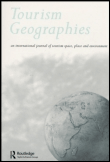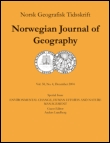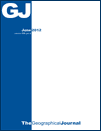
Journal of Cultural Geography
Scope & Guideline
Mapping the Cultural Dimensions of Our World
Introduction
Aims and Scopes
- Cultural Landscapes and Identity:
The journal focuses on how cultural landscapes are constructed and perceived, exploring themes of identity, belonging, and memory in various contexts. - Urban and Rural Geographies:
It examines the dynamics of urban and rural spaces, analyzing how cultural practices influence and are influenced by geographical settings. - Participatory Research Methods:
The journal emphasizes participatory approaches, such as participatory geographic information systems (PGIS), to engage communities in research and to empower marginalized voices. - Transnational and Global Perspectives:
Research often addresses transnational movements and global cultural exchanges, considering how local cultures adapt and respond to global influences. - Social Justice and Equity:
A core aim is to highlight issues of social justice, equity, and representation in geographical research, making visible the experiences of marginalized groups. - Interdisciplinary Approaches:
The journal encourages interdisciplinary research that draws from cultural studies, sociology, anthropology, and geography to provide a holistic understanding of cultural phenomena.
Trending and Emerging
- Decolonization and Indigenization:
There is an increasing focus on decolonization and indigenization, exploring how indigenous perspectives and practices shape cultural geography and challenge dominant narratives. - Digital and Virtual Geographies:
Research exploring the intersections of digital culture, virtual reality, and geography is on the rise, reflecting the growing importance of digital spaces in shaping cultural experiences. - Migration and Transience:
Emerging themes around migration, refugee experiences, and the complexities of belonging in transient spaces are becoming more prominent, highlighting the need to understand these dynamics in contemporary contexts. - Ecological and Environmental Geographies:
Papers addressing ecological issues and the relationship between culture and environment are trending, emphasizing the importance of sustainability and ecological justice in cultural geography. - Cultural Practices in Urban Spaces:
There is a notable increase in research examining cultural practices within urban settings, particularly how these practices reflect and shape urban identities and social dynamics.
Declining or Waning
- Traditional Spatial Analysis:
There has been a noticeable decrease in conventional spatial analysis methods, with fewer studies relying solely on quantitative data to inform cultural geography. - Historical Geography without Contemporary Context:
Papers focusing strictly on historical geography without linking to contemporary issues or cultural relevance are becoming less common, suggesting a shift towards more integrative approaches. - Static Representations of Place:
Research that presents static or unchanging representations of place is waning, as the journal increasingly favors dynamic, evolving interpretations of space and culture. - Homogeneous Cultural Narratives:
There is a declining interest in studies that present homogeneous cultural narratives, as the field moves towards celebrating diversity and complexity in cultural identities. - Eurocentric Perspectives:
Research that predominantly reflects Eurocentric perspectives is diminishing, indicating a broader commitment to inclusivity and global representation in cultural geography.
Similar Journals

Fennia-International Journal of Geography
Unveiling the complexities of our world through geography.Fennia-International Journal of Geography is a prominent peer-reviewed journal published by the Geographical Society of Finland, dedicated to advancing the field of geography through innovative research and critical discourse. With an ISSN of 0015-0010 and an E-ISSN of 1798-5617, this journal has established itself as a vital resource for academics and professionals alike since its inception in 1976. Notably transitioning to an Open Access model in 2010, Fennia provides wide accessibility to its content, fostering a global exchange of ideas and findings in various sub-disciplines of geography. The journal is currently categorized in the Q2 quartiles for Ecology, Forestry, and Geography, Planning and Development, indicating its influential standing among scholarly publications. Its Scopus rankings reflect its relevance and significance, including a 63rd percentile rank in Agricultural and Biological Sciences, and a 59th percentile in Social Sciences. Fennia serves as a crucial platform for the dissemination of research findings, policy analysis, and theoretical explorations, thereby greatly contributing to the understanding and development of geographical sciences globally.

Atelie Geografico
Empowering Research for a Better Understanding of Our World.Atelie Geografico, published by the Instituto de Estudos Socio-Ambientais at UNIV FED GOIAS, serves as a crucial platform for the dissemination of research within the realm of Geography and related disciplines. With an ISSN of 1982-1956 and an e-ISSN of 1982-1956, this Open Access journal has been championing the free exchange of knowledge since 2007, making it accessible to a global audience of researchers, practitioners, and students. The journal's scope spans vital areas including Urban Studies, Management and Policy, Nature Conservation, and Tourism, highlighting its interdisciplinary approach to understanding socio-environmental dynamics. Despite its ranking in the Q4 category across several fields in 2023, the journal emphasizes the importance of emerging voices and innovative research, particularly as it converges towards exploring contemporary issues from 2019 to 2024. Located in Brazil, Atelie Geografico not only enriches the academic landscape but also responds to regional and global challenges, encouraging a diverse readership engaged in the critical study of environmental and social interactions.

Geografisk Tidsskrift-Danish Journal of Geography
Exploring the Dynamics of Earth and Space.Geografisk Tidsskrift-Danish Journal of Geography, an esteemed publication by the Royal Danish Geographical Society, serves as a pivotal platform for disseminating innovative research in the realms of geography and earth sciences. Established in 1972, the journal has sustained its academic rigor through 2024, achieving Q2 quartile rankings in both Earth and Planetary Sciences and Geography, Planning and Development. With an ISSN of 0016-7223 and E-ISSN 1903-2471, this journal engages a global audience, including researchers, professionals, and students who seek to explore diverse geographical and environmental issues through high-quality research articles. Although currently non-open access, the journal thrives as a vital resource within the academic community, evidenced by its notable Scopus rankings, which place it in the upper percentiles of its respective categories. By providing critical insights into geographical phenomena, Geografisk Tidsskrift plays an integral role in advancing the understanding of complex spatial dynamics and fosters scholarly dialogue among geographers worldwide.

Tourism Geographies
Innovating Insights for a Sustainable Tourism FutureTourism Geographies is a leading academic journal published by ROUTLEDGE JOURNALS, TAYLOR & FRANCIS LTD, specializing in the diverse and dynamic field of tourism studies. With a Focus on the intersections of geography, planning, and development, this journal has established itself as an authoritative source for innovative research and insights since its inception in 1999. The journal not only holds a prestigious Q1 rank in both the categories of Geography, Planning and Development and Tourism, Leisure and Hospitality Management but also boasts remarkable rankings in Scopus, reflecting its impact and relevance in the academic community. With years of knowledge converging till 2024, Tourism Geographies provides critical perspectives and findings that contribute to the sustainable development of tourism practices worldwide. Researchers, professionals, and students engaged in tourism and related fields will find this journal to be an invaluable resource for advancing their understanding and shaping future policies within the industry.

Norsk Geografisk Tidsskrift-Norwegian Journal of Geography
Connecting past insights with future discoveries.Norsk Geografisk Tidsskrift-Norwegian Journal of Geography, published by Routledge Journals, Taylor & Francis Ltd, is a pivotal peer-reviewed journal that has been instrumental in advancing the field of geography since its inception in 1926. With an esteemed Q2 ranking in both Earth and Planetary Sciences and Geography, Planning and Development categories, it serves as a vital resource for researchers, professionals, and students seeking to deepen their understanding of geographical phenomena. The journal's rich historical archive, covering significant periods in geography and environmental studies, showcases a diverse array of articles that reflect ongoing research trends and challenges within the field. Despite not offering Open Access, its impactful content remains accessible through institutional subscriptions, underscoring the journal's commitment to advancing geographical research and fostering scholarly dialogue. As it continues to publish high-quality research, Norsk Geografisk Tidsskrift stands as a key player in geographical scholarship, reinforcing its importance within the academic community.

GEOGRAPHICAL JOURNAL
Navigating the complexities of the earth's surface for impactful solutions.Geographical Journal, published by Wiley, is a leading scholarly resource dedicated to advancing the field of geography and earth-surface processes. With an established history dating back to 1973, this prestigious journal thrives on disseminating high-quality research, featuring a robust archive that encompasses critical insights from various geographical and environmental studies. As evidenced by its impressive Q1 rankings in both Earth-Surface Processes and Geography, Planning and Development, the journal stands out in its commitment to impact and relevance in the academic community. Although not Open Access, the journal provides researchers, professionals, and students with invaluable peer-reviewed articles essential for understanding complex geographical phenomena. Whether you are focused on socio-environmental interactions or earth sustainability, Geographical Journal serves as a cornerstone for innovative research, fostering knowledge that shapes policy and practice.

Anales de Geografia de la Universidad Complutense
Exploring Urban Dynamics through Scholarly DiscourseAnales de Geografia de la Universidad Complutense is a prominent journal in the fields of Geography and Urban Studies, published by Universidad Complutense de Madrid. With a rich academic tradition since its inception, this journal has been open access since 1981, ensuring that valuable research is readily available to scholars and practitioners alike. The journal holds a significant position within the academic community, reflected in its Q3 ranking in both Geography, Planning and Development and Urban Studies categories as of 2023, and it provides an essential platform for interdisciplinary research and dialogues on pressing geographical and urban issues. As part of the Scopus indexed database, it ranks #201 out of 279 in Urban Studies and #684 out of 821 in Geography, indicating its growing influence and relevance. Based in Madrid, Spain, the journal welcomes contributions that aim to advance knowledge, foster collaboration, and stimulate critical thinking in these dynamic fields.

Geographica Pannonica
Unveiling Insights into Earth and SocietyGeographica Pannonica is a premier, open-access journal dedicated to the various dimensions of geography, atmospheric sciences, geology, and related fields. Published by the University of Novi Sad's Faculty of Natural Sciences and Mathematics, this Serbian journal has been a vital platform for scholarly discourse since its inception, with an open-access policy established in 2010 to enhance the dissemination of research findings. Covering a spectrum of topics from Earth-surface processes to tourism management, the journal has achieved notable rankings, reflecting its commitment to impactful research—ranking in the Q3 quartile across multiple categories in 2023. Researchers, professionals, and students are encouraged to engage with the latest articles that contribute to advancing our understanding of geographical phenomena and sustainability challenges, making Geographica Pannonica an essential resource for the global academic community.

Dearq
Connecting Scholars to Inspire Socio-Environmental ChangeDearq, an esteemed academic journal published by UNIV ANDES, is recognized as a vital source of knowledge in the fields of Architecture, Geography, Planning, and Urban Studies. As an Open Access journal since its inception in 2007, it provides researchers, professionals, and students with a platform to disseminate high-quality research that fosters innovation and progress in these dynamic disciplines. With an impressive track record of converging research from 2019 to 2024, Dearq currently holds a Q2 ranking in Architecture and Q3 rankings in both Geography, Planning, and Development, as well as Urban Studies for 2023. This editorial momentum reflects its commitment to advancing scholarly dialogue and critical inquiry. Located in Colombia and fostering a global perspective, Dearq is dedicated to enriching the academic landscape, making it an indispensable resource for anyone seeking to explore and understand complex socio-environmental issues.

Documenti Geografici
Empowering Scholars with Cutting-Edge ResearchDocumenti Geografici is a prestigious academic journal published by UNIV STUDI ROMA TOR VERGATA, FAC LETTERE & FILOSOFIA, specializing in interdisciplinary research bridging Economics, Geography, and History. Founded in 2019, this journal serves as a vital platform for scholars, researchers, and policymakers by disseminating innovative research findings and methodologies in the diverse fields encompassed within its scope. Currently categorized in the Q4 quartile for Economics, Econometrics and Finance (miscellaneous) and Geography, Planning and Development, and ranked in the Q3 quartile for History, Documenti Geografici offers insights that are valuable for advancing academic discourse. With its unique perspective and commitment to open dialogue, this journal is dedicated to fostering a deeper understanding of socioeconomic trends and spatial dynamics, making it an essential resource for those engaged in the humanities and social sciences. Manuscripts submitted to the journal benefit from a diligent peer-review process, ensuring high quality and relevance of published articles, thus contributing appreciably to the broader academic community.